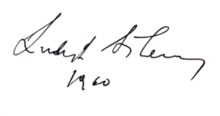Ludvík Aškenazy
This article needs additional citations for verification. (June 2015) |

Ludvík Aškenazy (24 February 1921 in Stanisławów, Second Republic of Poland – 18 March 1986 in Bolzano, Italy) was a Czech writer and journalist. He was born into a Jewish family in Stanisławów, then part of the Second Republic of Poland, now present-day Ivano-Frankivsk, Ukraine (also the site of the Stanisławów Ghetto).
He studied Slavonic philology in Lviv, which was then part of Poland.
During World War II, he was a soldier in the Czech units of the Soviet Army in the Soviet Union. He was a member of the Communist Party of Czechoslovakia. Between 1945 and 1950 he worked in the state and after that he became government-sanctioned "writer."
After the Soviet invasion of Czechoslovakia in 1968, he left for exile and until 1976 lived in Munich. Between 1976 and 1986, he lived in the Italian town of Bolzano with his wife, , daughter of the German writer Heinrich Mann.[1] He has two sons, Jindřich Mann, also a writer, and Ludwik Mann, who illustrated a number of his books.
He won the Deutscher Jugendliteraturpreis in 1977 for his book Wo die Füchse Blockflöte spielen,[2] and was shortlisted for the same prize in 1993 for Der Schlittschuhkarpfen.[3]
He is celebrated in an annual festival in the town of Český Těšín, Czech Republic.
See also[]
List of publications (partial)[]
- Wo die Füchse Blockflöte spielen (1977)
- Der Schlittschuhkarpfen (1981)
- Du bist einmalig
- Blaubart und die Elefanten (1983)
Filmography[]
- 1953: Můj přítel Fabian (German title: Mein Freund Fabian) – Director: Jiří Weiss
- 1957: Tam na konečné (German title: An der Endstation) – Director: Ján Kadár, Elmar Klos
- 1959: Májové hvězdy (German title: Sterne im Mai) – Director: Stanislav Rostotsky
- 1964: Křik (German title: Der Schrei) – Director: Jaromil Jireš (Screenplay)
- 1974: Tatort – 3:0 for Veigl (Actor)
References[]
- ^ ed. Věra Menclová, Václav Vaněk (2005). Slovník českých spisovatelů (in Czech). Prague: Libri. p. 53. ISBN 80-7277-179-5.CS1 maint: extra text: authors list (link)
- ^ www.akj.de, AKJ-. "Wo die Füchse Blockflöte spielen". Arbeitskreis für Jugendliteratur e.V. (in German). Retrieved 2020-07-02.
- ^ www.akj.de, AKJ-. "Der Schlittschuhkarpfen". Arbeitskreis für Jugendliteratur e.V. (in German). Retrieved 2020-07-02.
External links[]
- 1921 births
- 1986 deaths
- People from Ivano-Frankivsk
- People from Stanisławów Voivodeship
- Czech Jews
- Communist Party of Czechoslovakia members
- Czech journalists
- 20th-century Czech dramatists and playwrights
- Czech male dramatists and playwrights
- Czechoslovak expatriates in Italy
- 20th-century journalists
- Czech writer stubs
